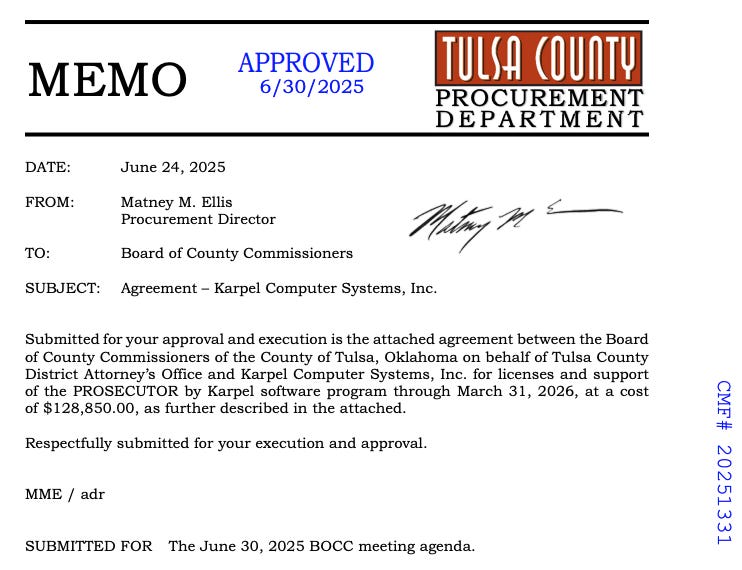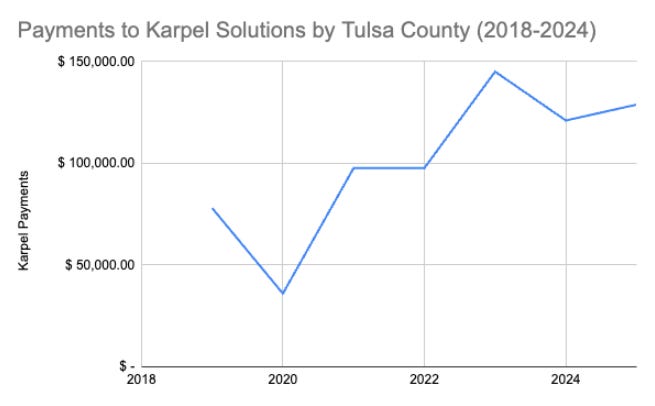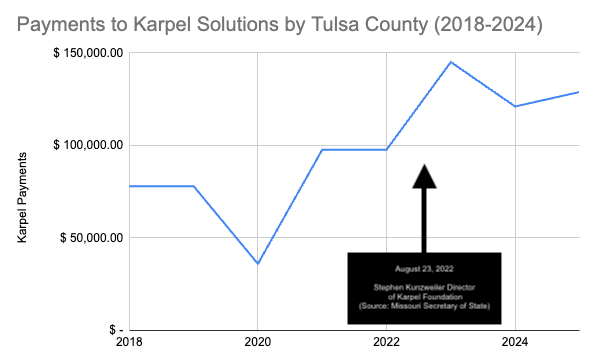The Prosecutor's Software Club
Following the money leads to some interesting questions for Tulsa County.
I rubbed my temples in frustration, quietly cursing.
“Ok,” I finally say into the phone, “I just don’t understand how in the absolute ungodly fuck that is even possible, but it is what it is.”
Part of what people pay us for at Permanent Record is taking large volumes of civil or criminal discovery material, working through it, disambiguating it, and then providing analysis back to the attorneys that hire us. We round this out with public records requests, guiding attorneys to discover additional records, and support the drafting of subpoenas—all the usual fun stuff.
But you see, discovery is a finicky and often-fought-over thing in American courts. This is never more evident than when a prosecution service implements a new software “system” or “process” to “streamline discovery”, only to do everything in its power to fuck up cases and slow them down.
I continue to rub my temples, contemplating how entire folders of discovery were somehow not turned over to us during critical pre-trial preparations—a software problem.
It got me thinking… what software are prosecutors using anyway?
Turns out, this is a much more interesting question than I thought.
God Only Knows
Not gonna lie, I hadn’t spent a ton of time thinking about case management software for prosecutors.
Some Kagi-searching yielded far more results than I had anticipated. The usual suspects from the FOIA-Game™, such as Tyler Technologies, were present along with other case management suites, like Clio. Too many options from this point. I needed to drill down into a locale to see what’s been implemented.
This all got me thinking specifically about Oklahoma, where I spend a good amount of time as a volunteer investigator for Oklahoma Appleseed. I tightened up my searches and found a Tulsa County Board of Commissioners document for a software platform called “PROSECUTOR”. Developed by Karpel Solutions Inc.

This is where things got interesting, fast.
Karpel Computer Systems Inc.
Software systems are expensive, particularly specialized systems. So it was no shock to me that in 2017, when Karpel Computer Systems was first awarded a contract, the sticker price was $484,730.00 USD. The details in the contract spell out where that money goes and why. The initial heavy-lifting for large projects of any kind usually involves high upfront costs that will then level out or drop over time.
As is my custom, I crack open a new Google Sheet and punch the initial amount into a column labelled 2017. Then I click the next contract in the list from the Tulsa County website. The 2018 document is less clear to me, as it appears the County is approving a renewal of some kind, but I can’t decipher an amount. I leave the 2018 spot blank in my Google Sheet and keep clickin’.
I repeat this process for the ten documents that are readily available from the Tulsa County website. By the end of it, my conservative estimate was that Karpel Solutions had billed Tulsa County approximately, $1,188,980.00 USD in the 8 years they've been engaged in a business relationship. Not a massive amount of money, but not exactly chump change either.
I sliced off the initial contract from 2017, and the blank 2018 year and then graphed out the remaining annual payments to Karpel.
What was immediately noticeable was the uptick in annual costs starting in 2021, continuing through 2023. The contracts with Karpel do indicate that there are usage-based fees (such as storage of electronic media, files, etc.) that can accumulate year over year, but there was a 48% increase in costs between 2022 ($97,650.00) and 2023 ($145,050.00). The explanation for that increase wasn’t immediately clear to me based on my reading of the public documents.
Now I was curious. What is a “Karpel” anyway?
Karpel Solutions and Karpel Foundation
It’s a dude.
Jeff Karpel is his name, and he founded Karpel Solutions in the 1980s, but it was in the 1990s that the company started building case management software for prosecutors. Later, this branched out into defence-focused software and a services division. Based on their website, it seems as though they have deployments in Oklahoma, Missouri, California and elsewhere.
A search for subsidiaries and local branches of Karpel in OpenCorporates yielded some more hits. Sweeping through the list, I spotted something interesting: a non-profit organization.
As most software millionaires desire, it seems Jeff Karpel formed a non-profit entity, Karpel Foundation. The Foundation has the same mailing address as Karpel Solutions. I think we can safely call the two organizations related parties.
Non-profits always spring my investigative antennae up, as they have more public documents available for inspection than regular corporate entities. I didn’t make it that far, as the list of directors for Karpel Foundation made me explode out of my chair.
It includes, but is not limited to:
Jeff Karpel, founder of Karpel Software, of course.
Jean Peters Baker, former Jackson County, Missouri, prosecutor;
Jeannine Pacioni, Monterey County, California, district attorney;
Jeff Reisig, Yolo County, California, district attorney; and
And last on the list, none other than Stephen Kunzweiler, the current District Attorney of Tulsa County, Oklahoma.
While I couldn’t speak for the other jurisdictions and district attorneys, I knew that Tulsa County had purchased at least $1.2m in software and services from Karpel, with the client for those expenditures being Mr. Kunzweiler’s office within the County. I had seen Kunzweiler’s signature on some of the Karpel contract documents directly.
So how could Kunzweiler also be sitting on a Foundation board, with the ultimate beneficial owner of the software company, Jeff Karpel, as the executive director? Mr. Kunzweiler directly oversees the purchases from Mr. Karpel’s for-profit entity.
Just how long had Mr. Kunzweiler been sitting on this Karpel Foundation board?
A search of the Missouri Secretary of State records shows that Karpel Foundation was incorporated on February 20, 2014, and at that time, Kunzweiler had not been on the list of directors. In an August 23, 2022, filing, we see Kunzweiler listed as a director.
If we now put that in our graph from before:
This all seems troubling to me. Right around the time Kunzweiler became a director of the non-profit Karpel Foundation, the expenditures by Tulsa County increased by 48% and have remained at those increased levels since.
This doesn’t mean there’s something illegal or nefarious going on. Not enough information to go quite that far yet. However, I also know that my estimates for payments are likely low, and the $1.2m amount could be materially higher, simply because I was unable to estimate the total costs for some years.
There’s only one thing to do. I crack open my Permanent Record-FOIA-writing-ninja-app and humbly request all contracts, emails, payments, receipts and other materials that our dear Tulsa County has in their possession as it relates to all the things Karpel.
And when those documents come back, friends?
Rest assured, you’ll be the first to know.
And it might be sooner than you think.




